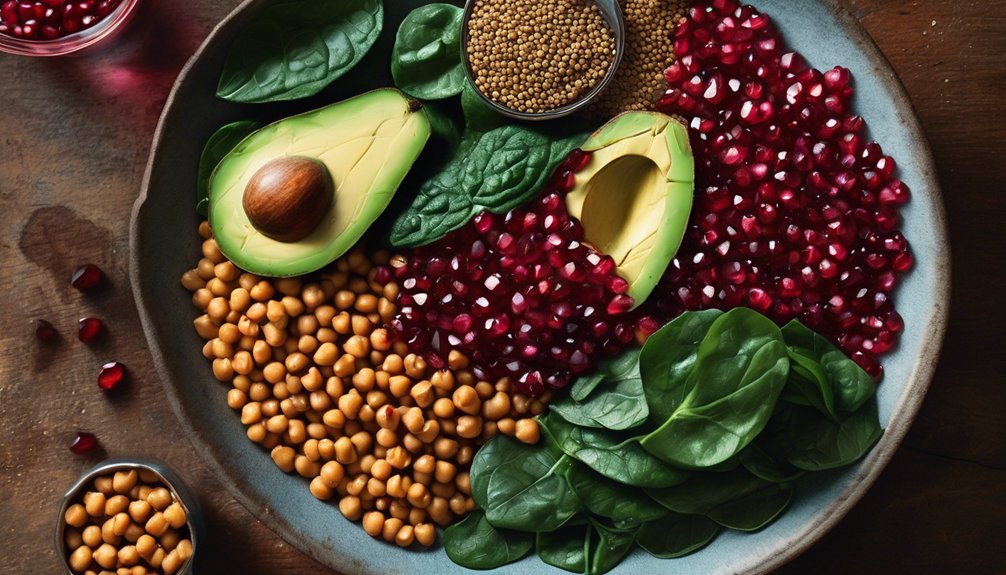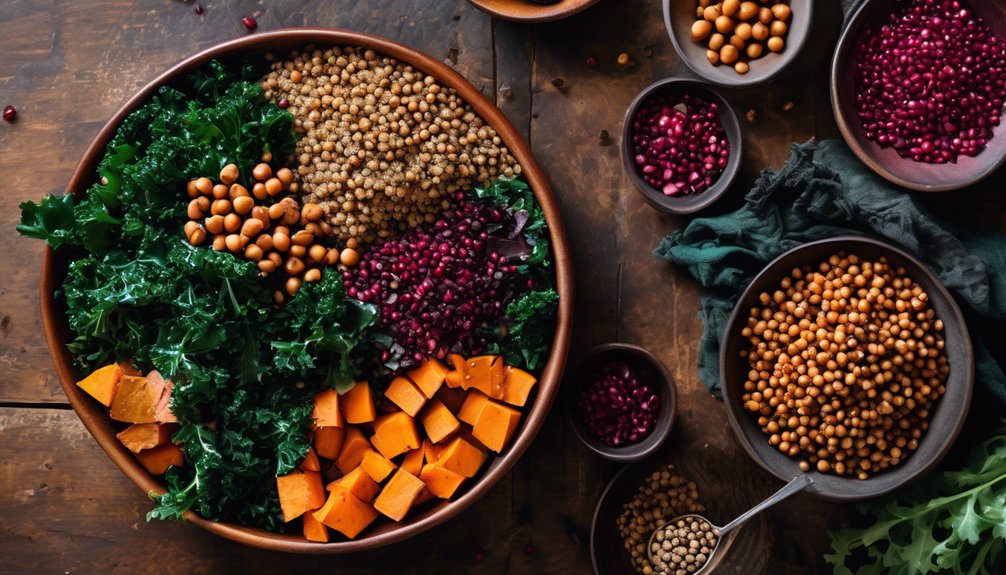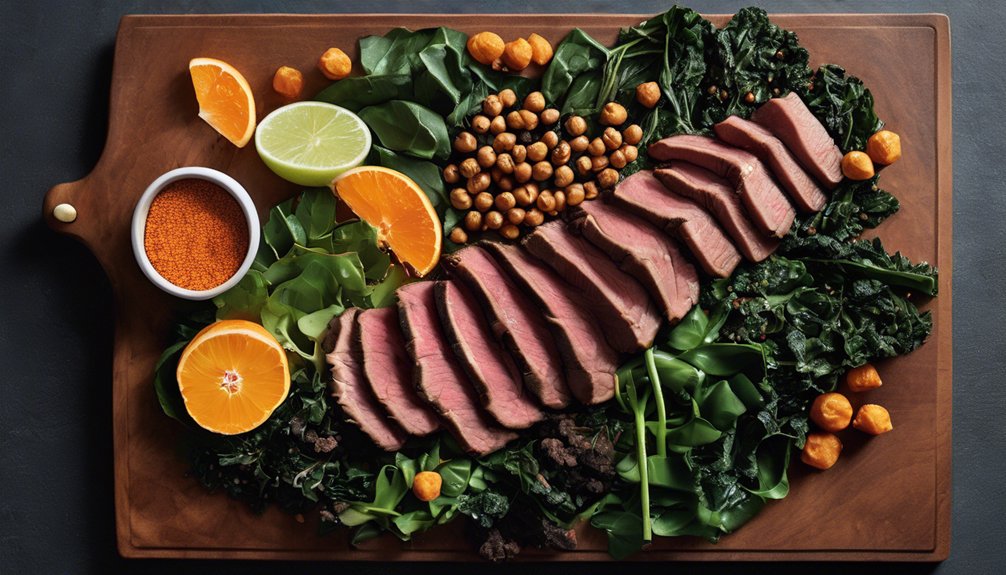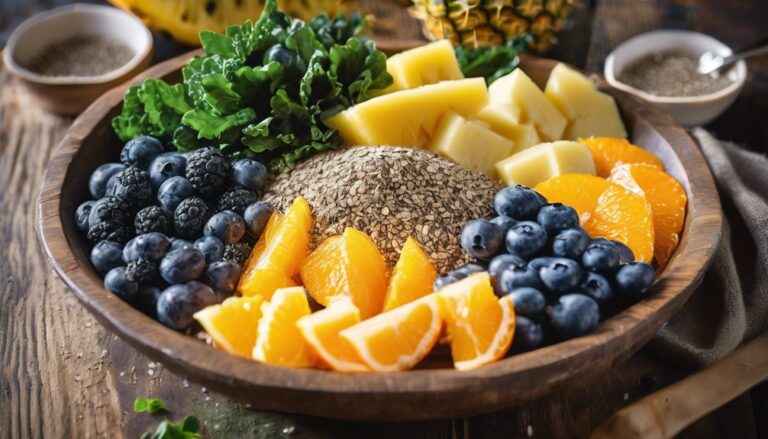Iron-Rich Foods for Women
You might think iron isn't a big deal, but it's crucial for your health, especially if you're a woman. Low iron levels can lead to fatigue and weakened immunity, impacting your daily life. The good news is that there are plenty of iron-rich foods to include in your diet. From vibrant plant-based options to robust animal sources, let's explore how you can easily boost your iron intake and enhance your overall well-being.
Key Takeaways
- Beef liver, oysters, and clams are excellent animal-based sources of iron, with clams providing the highest amount at 28 mg per 100g.
- Plant-based options like lentils, chickpeas, and leafy greens such as spinach and kale also offer significant iron content.
- Combining iron-rich foods with vitamin C enhances absorption, improving overall iron benefits.
- Women typically need about 18 mg of iron daily, especially during menstruation or pregnancy.
- Iron supplements may be necessary for those unable to meet dietary needs; consult a healthcare provider before starting.
The Importance of Iron for Women's Health
Iron plays a crucial role in women's health, impacting everything from energy levels to immune function. When you experience iron deficiency, it can lead to fatigue, weakness, and a weakened immune response, making you more susceptible to illness.
The health implications are significant; low iron levels can also affect your mood and cognitive function, leaving you feeling irritable and unfocused. It's essential to recognize the signs of iron deficiency early, so you can take proactive steps to boost your iron intake.
Incorporating iron-rich foods into your diet not only supports your overall well-being but also enhances your vitality. Remember, prioritizing iron isn't just about preventing deficiency; it's about nurturing your body and empowering yourself to thrive every day.
Top Animal-Based Iron Sources
When it comes to boosting your iron intake, animal-based sources are some of the most effective options. Incorporating these foods into your diet can significantly enhance your iron levels, especially when you're looking for quick absorption.
| Food Source | Iron Content (mg per 100g) |
|---|---|
| Beef Liver | 6.2 |
| Oysters | 7.0 |
| Clams | 28.0 |
| Chicken Breast | 1.0 |
Beef liver is a powerhouse of nutrients, offering a rich supply of iron. Additionally, shellfish varieties, such as clams and oysters, provide excellent iron levels, making them a delicious choice. By focusing on these options, you'll be well on your way to meeting your iron needs!
Plant-Based Iron-Rich Foods
While animal-based sources provide a significant boost to your iron intake, plant-based options can also play a vital role in meeting your nutritional needs.
Incorporating legumes into your diet, like lentils, chickpeas, and black beans, can significantly enhance your iron levels. These legume sources not only offer iron but also provide protein and fiber, making them a wholesome choice for any meal.
Don't forget to add leafy greens such as spinach, kale, and Swiss chard to your plate. These greens aren't only rich in iron but also packed with vitamins and minerals.
Enhancing Iron Absorption
To maximize the benefits of iron-rich foods, it's essential to enhance your body's absorption of this crucial mineral.
Combining iron sources with vitamin C can significantly boost iron absorption. Think about enjoying a spinach salad with citrus dressing or pairing lentils with bell peppers; these combinations work wonders.
Avoid consuming calcium-rich foods or beverages, like dairy, at the same time as your iron sources, as they can hinder absorption. Additionally, try to limit your intake of tea and coffee during meals, as their tannins may also affect how well your body absorbs iron.
Iron Supplements: When and Why
If you're struggling to get enough iron from your diet alone, iron supplements can be a practical solution.
They're especially helpful if you're pregnant, have heavy menstrual periods, or follow a vegetarian or vegan diet.
Here are some key points to consider:
- Iron Supplement Types: Common forms include ferrous sulfate, ferrous gluconate, and ferrous fumarate.
- Recommended Dosages: Most women need about 18 mg of iron daily, but this may vary based on individual needs.
- Timing Matters: Take your supplement on an empty stomach for better absorption.
- Consult Your Doctor: Always discuss with a healthcare provider before starting any supplement to ensure it's right for you.
Understanding these factors can help you make informed choices about your iron intake.
Meal Ideas to Boost Iron Intake
Incorporating iron-rich foods into your meals is essential for maintaining optimal health, especially for women who may have higher iron needs.
Start your day with an iron-rich breakfast by enjoying oatmeal topped with sliced almonds and dried apricots. For lunch, a spinach salad with chickpeas and grilled chicken can pack a punch of iron.
Don't forget to include iron-packed snacks like hummus with carrot sticks or a handful of pumpkin seeds throughout your day. You can also experiment with quinoa and lentils in your dinner recipes for an extra boost.
Common Myths About Iron and Women
While many people understand the importance of iron for women's health, several myths persist that can lead to confusion about iron needs.
Let's debunk some common misconceptions:
- Only red meat contains iron – Many dietary sources like beans, lentils, and spinach are excellent iron providers.
- Iron deficiency only affects pregnant women – Women of all ages can experience iron deficiency, especially during menstruation.
- Plant-based iron is less effective – While non-heme iron is less absorbable, pairing it with vitamin C-rich foods can enhance absorption.
- You can't get enough iron from diet alone – With a balanced diet, it's entirely possible to meet your iron needs without supplements.
Understanding these myths helps you make informed choices about your health and nutrition.
Frequently Asked Questions
How Does Iron Deficiency Affect Pregnancy Outcomes?
Iron deficiency can lead to poor iron absorption, increasing your risk of pregnancy complications. You might face fatigue, preterm birth, or low birth weight. Prioritizing iron intake is crucial for both you and your baby's health.
Can Excessive Iron Intake Be Harmful to Women?
Yes, excessive iron intake can be harmful. Iron toxicity can lead to serious health issues. You should monitor your dietary sources, ensuring you balance iron consumption and avoid supplements unless prescribed by a healthcare professional.
What Are the Symptoms of Iron Overload?
If you experience iron toxicity symptoms, like fatigue, joint pain, or abdominal discomfort, it could indicate iron overload. Causes usually include excessive supplementation or genetic disorders, so it's vital to consult a healthcare professional for guidance.
Are There Any Interactions Between Iron and Medications?
Yes, certain medications can affect iron absorption, potentially reducing medication efficacy. It's important to talk with your healthcare provider about any medications you're taking, ensuring that your iron levels and treatment work together effectively.
How Does Menstrual Cycle Affect Iron Levels in Women?
Did you know that about 30% of women experience significant menstrual iron loss? Your cycle fluctuations can affect iron levels, especially during menstruation, leading to potential deficiencies if not managed properly.
Conclusion
Incorporating iron-rich foods into your diet is crucial for maintaining your energy and immune health. Did you know that nearly 10% of women in the U.S. suffer from iron deficiency anemia? By focusing on a variety of animal and plant sources, and enhancing absorption with vitamin C, you can significantly improve your iron levels. Don't overlook the importance of these foods; making informed dietary choices plays a vital role in your overall well-being.











